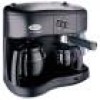DeLonghi BCO70 Owner Manual - Page 9
Cleaning And Maintenance, Descaling - espresso
 |
View all DeLonghi BCO70 manuals
Add to My Manuals
Save this manual to your list of manuals |
Page 9 highlights
wash it carefully with warm water. • Make sure that the three holes of the milk frother, illustrated in fig. 28, are not plugged. If necessary, clean the holes with a pin or needle and soaking the frother bit in warm water. • Clean the steam release tube carefully so as to not get burned. • Screw the milk frothing bit back into place. CLEANING AND MAINTENANCE • Before beginning any cleaning or maintenance operation, turn the machine off, remove the plug from the electrical power source and let the machine cool down. • To clean the machine, do not use solvents or abrasive detergents. A soft damp cloth should be used to clean the surfaces. • Regularly clean the filter holder, the drip collection pan, the hot water drip spout, and the coffee pots. Do not wash the filter holder in the dish washer. • Never immerse the machine in water: it is an electrical appliance. • Check from time to time that the holes in the filter for espresso coffee are not obstructed. If necessary, carefully clean the filter with hot water, scrubbing with an abrasive pad. DESCALING If the water in your area is quite hard, the lime from this water can accumulate with the passage of time. Lime deposits can compromise the proper functioning of the appliance. The espresso coffee machine must be decalcified every 2 to 6 months (depending on the hardness of the water and the frequency of use) using white wine vinegar. Proceed as follows: • Fill the coffee pot for espresso coffee with vinegar to level 4; • Pour the vinegar into the hot water tank and replace the plug; • Attach the filter holder; • Place the small coffee pot under the filter holder; • Turn the machine on and position the Vario System selector to the "LIGHT" position; • After a few minutes, the hot vinegar will begin to flow, through the filter holder, into the coffee pot. Release some steam every so often by turning the steam release knob. • When the all of the solution has gone through the machine, turn off the appliance and let it cool down. • Repeat these operations at least two times using clean water instead of vinegar in order to remove every trace of vinegar left in the circuits. The drip coffee machine must be decalcified every 90 cycles. The lime removal can be done by using the special lime remover solvents made for drip coffee machines found on the market. Alternatively, white wine vinegar can be used, following this procedure: • Pour two cups of white wine vinegar and three cups of water into the tank. Insert the tank into the machine. • Place the coffee pot onto the hot plate and the filter holder on this without coffee; • Press the ON/OFF drip coffee switch, percolate the equivalent of a cup of the solution and then turn off the appliance. • Allow the vinegar to sit in the machine for an hour; • Turn the machine back on and allow the rest of the solution to percolate through the circuits; • To rinse the appliance, operate the machine with plain water and without using ground coffee at least 3 more times (3 full tanks of water). The repairs of the coffee machine due to maintenance operations that haven't been carried out, such as lime removal etc. will not be covered by warranty. 9















